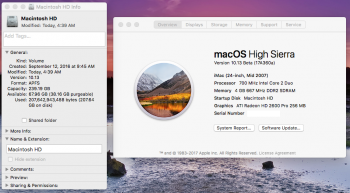Guys, I really hate to do this, but I simply can't stand sites like this and their... "reporting"

. Where does it actually say that, anywhere in those two links? Let's see.
AppleInsider
starts terribly:
Where does that information come from? If they had any real source, they would have linked to it. They didn't, so that's either (a) information they pulled out of thin air (terrible), or (b) their free interpretation of Apple's support document (equally terrible).
They even state later:
They didn't update it so far, so no information from Apple, but that didn't stop them from publishing this joke of a reporting.
This Apple's support document has been here for a while now and
the only thing it clearly states is that HFS installations of Sierra residing on HDDs will not be automatically converted to APFS during the upgrade to High Sierra, while HFS installations of Sierra residing on SSDs will and it will not be possible to opt out of that.
Doesn't say anywhere that you can't convert it yourself if you want to, that it won't be possible (and as we've seen, it's perfectly possible, we've done it here on the forums ourselves). Just that it won't be converted to APFS automatically during the upgrade process.
Apple is always very careful with their wording matching their intent.
Now,
to be very clear: what I'm saying is that this might very well be true, but just not based on
those two sources. So if you have other sources that actually confirm that - please link to them here, I'll be grateful (and I'm sure others too).
P.S.
@jhowarth @nekton1 Now, on a totally different note

. Those SATA II speeds are starting to annoy me more and more, and I'd like my SSDs to take advantage of their speed potential. Any advice on that front? What's
your current solution?
I'm not willing to buy PCI-E SSDs since I have 2,5" SSDs that are perfectly fine, so probably the only option for me is some kind of PCI-E card that I can connect them to. This card has to be bootable of course, and preferably natively (plug & play); just don't want the hassle of messing around with kexts, etc.
If it wouldn't cost a fortune, that would be nice too

.
Anyone with Mac Pros out there - please feel free to pitch in!


